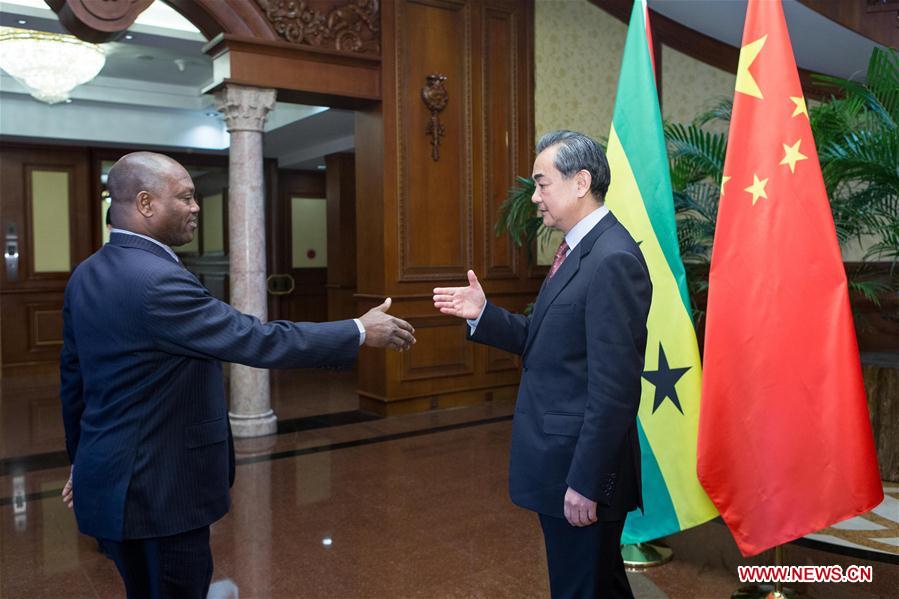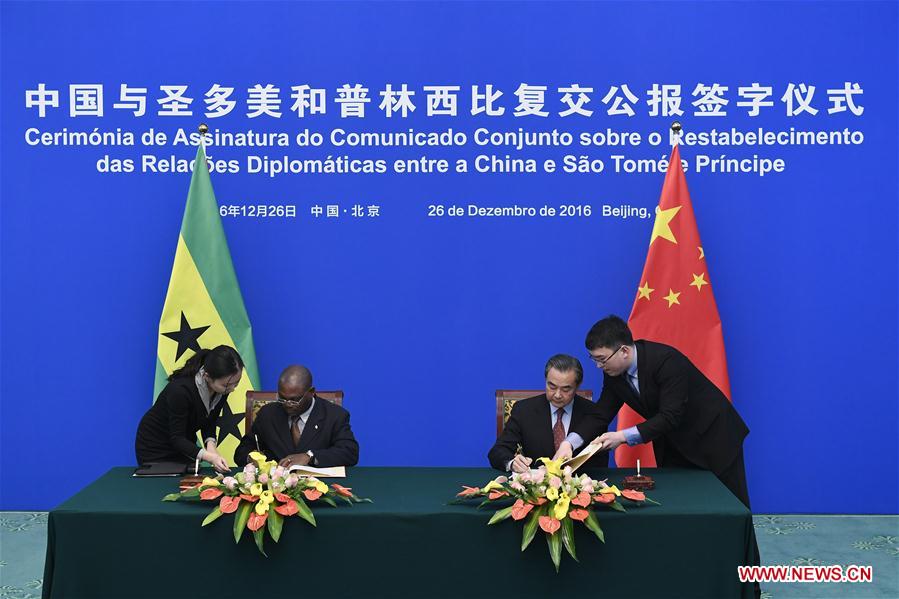Related reading:
BEIJING, Dec. 26 (Xinhua) -- China resumed diplomatic relations with Sao Tome and Principe in Beijing on Monday, after the African nation cut "diplomatic ties" with the Taiwan region last week.

Chinese Foreign Minister Wang Yi (R) holds talks with his counterpart of Sao Tome and Principe Urbino Botelho in Beijing, capital of China, Dec. 26, 2016. (Xinhua/Cui Xinyu)
Chinese Foreign Minister Wang Yi and Sao Tome and Principe counterpart Urbino Botelho held talks at the Diaoyutai State Guesthouse, and signed a joint communique on resuming diplomatic relations.
Sao Tome and Principe, an island nation in the Gulf of Guinea and a former Portuguese colony, established diplomatic relations with China immediately after gaining independence in 1975 but switched to the Taiwan region in 1997.
"The one-China principle is a consensus of the international community and a basic norm in international relations," Wang said. "China believes Sao Tome and Principe will stick to one-China policy with practical action and support China's peaceful reunification."
China suggested both countries work to enhance political trust and friendship of their people, as well as cooperation in agriculture, fishery and tourism.
Wang said China eyes cooperation with the island country within the Forum on China-Africa Cooperation, and the Forum for Economic and Trade Cooperation between China and Portuguese-speaking countries.
Botelho said Sao Tome and Principe will make up for its previous mistakes and open a new chapter in bilateral relations.
Sao Tome and Principe recognizes China's international influence and role in protecting the interests of developing countries, and support for its own and other African countries' struggle for independence, as well as welcoming Chinese investors and tourists to help with its national development and industrialization, Botelho said.
The Sao Tome and Principe government promises it will have no official relations with Taiwan. Instead, it acknowledges there is only one China, and the government of the People's Republic of China is the sole legitimate government representing China, and Taiwan is an inalienable part of China's territory, the communique said.
Both sides agreed to send ambassadors as soon as possible and start the process to establish embassies, according to the communique.
"We are delighted to see that the Sao Tome and Principe government follows historical trends and makes the correct decision to come back to the one-China principle," Wang said at a joint press conference after his meeting with Botelho.
"The one-China principle is the foundation of bilateral relations and both sides should understand and support each other on issues relating to their core interests or major concerns," Wang said.
"The restoration of diplomatic relations gives China a new friend in the international community, while Sao Tome and Principe will get all-round support and assistance from a permanent member of the UN Security Council and the world's largest developing country," Wang added.
This move will bring benefits to both countries, to Sao Tome and Principe in particular, and add new vitality to cooperation between China and Africa, Wang said.
Also on Monday, Chinese Vice President Li Yuanchao met with Botelho, saying the restoration of diplomatic relations is in line with the fundamental interests of both countries.
Li said China highly appreciates the Sao Tome and Principe government's return to the right track of one-China principle.
China will take the restoration of diplomatic ties as a new start to deepen political mutual trust and conduct all-round cooperation, Li said.
Botelho said his country attaches great importance to the relationship with China and will firmly adhere to the one-China principle and comprehensively forge ahead bilateral cooperation.

Chinese Foreign Minister Wang Yi (R) and his counterpart of Sao Tome and Principe Urbino Botelho sign a joint communique after their talks to resume the diplomatic relations between China and Sao Tome and Principe, in Beijing, capital of China, Dec. 26, 2016. (Xinhua/Yan Yan)















